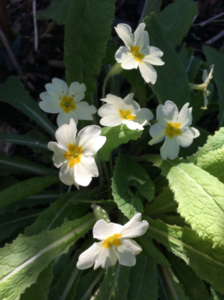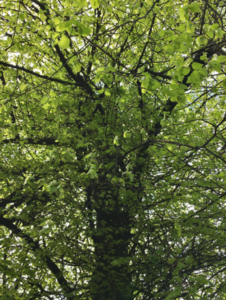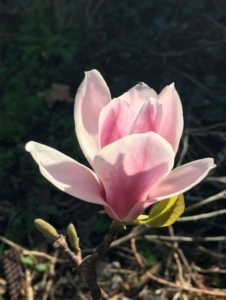



The UK government has just announced another 3 weeks of lockdown. This revived something of the initial panic in a lot of people. Over the last 3 weeks, the supermarket shelves had gone back to almost normal, but with this announcement the hoarding phenomenon returned. On the positive side, people are enjoying particular changes in the urban environment. Everyone remarks on the wonderful silence. Those that live under flight paths, love the lack of plane noise. The reduction of traffic noise too is impressive. The air is visibly clearer. Our little block of flats is set beside a main highway. Usually the building shakes with the vibration of the traffic all day long. We do not have that right now.
I am 70, so I belong to that group called vulnerable and had been asked not to go out at all during the lockdown, not even for shopping or exercising. I have no family. I live in a small block of 10 flats with a large communal garden. I am lucky, first of all to be taken care of by neighbours that shop for me, and secondly to have a place to go to that is outdoors, somewhere where I can do some gardening and sit around in. The beauty of Spring has delighted and sustained me. These 2 things are a lifeline for me at this time of isolation. In London, for those who do go out for exercise, some green spaces are open while others are closed. People are told to keep moving, and park benches, I hear from my friends, are taped so that people cannot sit on them! Some desperate people have been climbing over the walls and fences of their single local green spaces.
I have chosen to include uplifting photos from the garden, from the huge lime tree that burst into leaf dramatically within only 2 days with that very special Spring green to the colour, form and textures of the first flowers appearing.
My world of social contact is now 100% digital. My work goes on, with all the events I usually attend now on Zoom if they can manage it. My mobile, with its WhatsApp group and other interest groups, plays a key role in my everyday life. This contact gives me a wide picture of what is going on with friends and colleagues. The exchange includes uplifting images. Links to fear-ridden news items and funny videos do their rounds, as do alerts to good films and YouTube items. But, above all, it is the sharing of day-to-day activities and feelings that keep us all going in a time of severe disorientation. All of us, even the strongest personalities and the most rational within my circles, complain of an underlying strain that drains our energy. Almost all of us tire more easily than we usually do. Those among us that are sensitive suffer the most. Phoning the handful of closer friends has sometimes almost a ritualistic feel to it, done to maintain our hold on social connections. Even with nothing much to say, there is a draw to pick up the phone to repeatedly re-establish a much needed feeling of being in touch with others. That voice on the telephone is the prime vehicle of contact now for people like me, and there are many of us.
The other dimension that has affected me is the lack of activity in a small field that the back of our flats overlook. Before the lockdown, children played ball after school daily and people walked their dogs. Now most of the time there is nothing. Two days ago, three youngsters appeared with a ball. They kept a good distance from each other consciously and in the beginning one of them had gloves on. After a while the other two went away and came back with gloves on. Now for a while each day, they have come out doing the same.
Beyond the daily briefing by government, there are the personal stories. These hit the hardest in terms of an evolving picture. They strike hardest at our insecurities. There is no doubt that Covid-19 is undermining mental health. A social worker friend of mine tells me that her sector is expecting a huge surge in mental health issues when we return to a very different world beyond the lockdown. They are saying that the lockdown is expected to have an enduring impact on mental health for 2 generations. The huge shift in lifestyle as a result of the lockdown has disorientated everyone. At the center of it lies the ultimate threat – the potential of death in the most horrible way, struggling and failing to breathe. While, in the beginning, many people ignored the virus as something that will not happen to them, as time progresses more and more people are being touched by the reality of death in our society. The message will sink in. At some time soon, every single person will be personally in touch with death directly or indirectly through their social networks, or closer, within their families. I have friends that are strong and rational, that have had panic attacks. One friend described how, in the middle of the afternoon, he “felt physically a bit odd”. It was nothing big, but immediately imagined that he may have caught Covid-19 and die. This threw him into a frenzied panic that absolutely took him by surprise. All sorts of thoughts raced through his mind and all the symptoms of terrible fear took him over. He struggled to calm himself down. It took hours. By the evening he was sort of all right, and by the morning he was reassured because he had not physically worsened in any way. He knew he did not have the virus. In the days that followed he suffered from waves of fear, accompanied by physical symptoms such as a dry mouth, a rapid heartbeat. For him, his panic attack was set off by an incidental bodily feeling of feeling slightly off, exaggerated by a state of mind – that of an underlying fear that has crept into all our lives.
The government is managing a juggling act to try to get people to comply with isolation while at the same time acting to calm people. They do so by telling stories of how occasionally even young fit people without health issues have died from the virus to get the message through that “don’t think just because you are not in a vulnerable group, that you may not die”, while at the same time they talk about how particular very old people, including one 98 year old, have recovered from the virus. It is those stories that instill fear that stays around most in the community psyche. However, it is the tales coming from those that are within our own circles that have the most impact. One friend has an old pal in her 50s with significant ongoing health issues. That friend had decided to tell herself that nothing will happen to her, probably as a kind of denial or psychological defense. She has been one of the offenders in terms of practicing the recommended social distancing. She had been driving around, meeting with other friends taking the same position of “nothing is going to happen to us”. However her world fell apart when, recently, her doctor rang her up. Taking the stance of good practice that people should be informed and have choice, the doctor rang to tell her that she is one of a group, that, at a time of overwhelming demands on the health service, will not be treated if she got very ill. She was being rung up to ask her to choose between dying in a hospital and dying at home so that the decision can go into her medical notes. She was completely traumatised in the face of that information and inconsolable. A few days ago, a colleague of mine got an infection and had a high fever. He was given antibiotics but he worsened over days, lying in his bed at home. One day I got a text from him saying that he had been warned he might need to go to hospital. He, like so many of us, had been, over these weeks, fed stories about how people going into hospital for something other than Covid-19 had then caught the virus and died. These stories are absolutely rife. Hospitals are now seen as infected places. Items about how doctors and nurses with protective gear have caught the virus and died are frequently in the media. He texted me to say “they may as well shoot me now”. When someone is dying in hospital, it is rare that relatives are allowed to visit. I dread to think what the experience is like for a dying person when on exceptional occasions, relatives that are allowed to come to say goodbye do so donning masks and gloves. The number of people attending funerals is restricted, and some funerals are now on video. Grief, sadness, incomprehension and bewilderment are touching everyone.
Everyone is remarking that we are living through strange times, with dire uncertainty of what the world will be like when we finally survive all of this and come out of lockdown. However, for some, the massive undoing of societal life that has been made by reluctant governments demonstrate an unprecedented opportunity for the possibility of a change of societal direction for the better. Many, not just environmentalists, are aware that Covid-19 is playing itself out against the pre-existing message of a parallel looming disaster that will not go away – climate change. Covid-19 has engineered an experience of a partial collapse of society. Climate change scientists tell us that we have only 10 years to avert the disaster of a substantial collapse of society due to the undoing of natural systems leading to unimaginable food insecurity that will fuel social unrest. When we come out of this lockdown, they ask, will we have the courage to take the opportunity to re-design society for the better or will we simply revert? The visionaries among us hope for a societal courage that will drive us towards a collaborative world that seeks to act for the global common good. Experts tell us that the fact is, in the 21st century, we have enough food, knowledge, and technology to create a stable and marvelous world if we build on the awakening of our interconnectedness and act as one. The fundamental thing that stands in the way of a cohesive and prosperous world is that in a world of plenty, we refuse to share.
Covid-19 has forced us all to see what the basic essentials in life are. All the pointless distractions of our former lifestyle are now on hold. The key workers that hold the fabric of society together are vividly in the foreground. We take joy in seeing nature recover, whether it is the dolphins in Venice or the clear air in the city. We appreciate every ray of sunshine. Relationships to each other hold us together. Nature and therefore green spaces and greenery of all kinds, is increasingly seen as our refuge. Access to the sustaining quality of beauty is greatly valued. Many are beginning to take to growing food. We know food security is what keeps us alive. The climate change message is beginning to hit home within a very different context. We know that the earth can give us everything we need if we work with it. If we work against it and significantly damage it, the earth responds powerfully, especially through weather patterns. She set Australia on fire. She half-drowned the UK. The planet as a raging mother is terrifying. The limitations of science are on show right now with Covid-19. It shows us that it is far better to work with nature, and use science to support the process, than to take no notice of nature in the name of profit-making and misuse science as a methodology for picking up the pieces. There is at present an awakening. Rising from deep within ourselves, we are recognising that true power is life itself, and humanity is an inseparable part of the living planet. I am hopeful.



 Judy Ling Wong CBE April 2020
Judy Ling Wong CBE April 2020


